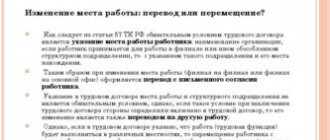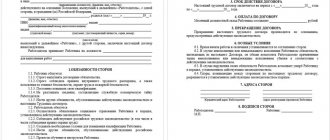24.10.2019
0
194
4 min.
Relations between the parties are regulated by an employment contract; it is in this document that the important conditions and features of the work that the citizen will perform must be fully spelled out. Particular attention is paid to the specifics of the activity, the duration of the shifts, the number of days off and wages. But in addition to this, it is necessary to specify the nature of the work. It comes in different types, which affects the required allowances and compensation.
What is the nature of work in an employment contract?
The nature of work is the norms and specifics of performing functional duties, which provide additional difficulties for the employee.
They are expressed in the fact that the employee may not have a specifically established workplace where he is obliged to spend his working day.
Provisions on the workplace, work time and rest are mandatory conditions that are fixed in separate clauses in the labor contract concluded by the parties, along with other requirements.
IMPORTANT: Only the workplace specifically established in the employment contract, indicating the address and working hours, allows for supervision of compliance with discipline, as well as imposition of disciplinary liability.
This regulation for making entries is regulated by Article 57 of the Labor Code of the Russian Federation. But sometimes it is impossible to reliably determine the workplace, which is due to the nature of the work.
Also for this reason, it is sometimes impossible to set a fixed work schedule. Some professions, which will be discussed below, fall under the criterion of such situations.
In the event that a profession falls under one of the special criteria, this circumstance must be indicated in a separate provision of the contract.
If the work is performed according to a set schedule, at a fixed workplace, this item is not necessary to fill out.
What types are there? Examples of different types of activities
Now about the types of work characteristics in an employment contract. That is, what are they?
Non-standard situations are identified by one characteristic – the lack of a stable workplace.
They are divided into 3 types, in accordance with the characteristics required to perform their duties:
- mobile nature of work;
- on my way;
- traveling
Mobile work is characterized by the fact that workers are assigned to a workplace temporarily - for the period of performance of work.
When the job is completed, they move on to a new facility. This category primarily includes construction workers, road workers, or workers installing pipelines and other linear facilities.
This category also includes a number of agricultural professions, if the place of work needs to be moved or “moved” when driving pastures over long distances, transporting an apiary, etc.
The same applies to sawing wood, when workers need to change cutting areas. Work on the road means that professional activities are carried out only on the road.
That is, the person to whom this regime is established may be:
long-distance driver;- driver or his assistant;
- conductor, steward (stewardess);
- pilot, aircraft navigators;
- captain, navigator or other specialist - on a ship;
- forwarder, courier (in certain cases).
The list of such specialties is quite extensive. They have one thing in common - the performance of functional duties is carried out only in the process of moving a vehicle (convoy) or a watercraft and an aircraft.
Traveling - this type of activity is characterized by blurred boundaries of definitions. The list of legislation does not contain appropriate criteria for its precise identification.
Therefore, the employer has to independently establish regulations on this type of duties, differentiating the traveling nature of work from regular business trips.
This difference is described in Government Decree No. 749, dated 10/13/08.
The business trip has a one-time registration and does not relate to the traveling nature of the activity.
Traveling refers to the employee’s movement to different sites during the day, but upon completion, he returns home just as after a regular shift.
Examples of professions that may fall into this category include:
- courier;
- adjuster;
- equipment installation wizards;
- postman;
- driver;
- forwarder;
- sales representative;
- manager
Unlike work on the road, there are no long distances between objects, and workers, in addition to transportation, also perform other duties.
Most of the work is performed within the same locality or close to it.
This category of activity includes agricultural work that requires systematic travel outside the populated area.
The listed types must be distinguished using legislative acts, including those of a regional and local nature.
In some cases, it is permissible to use the category “other” character. It is determined by the employer (field, expeditionary, rotational, home-based, etc.).
List of positive human qualities for a resume
The employer considers each character trait from the point of view of convenience and usefulness for the company. Therefore, the set of qualities you include in your resume should depend on the specifics of the vacancy. Of course, all the personal qualities listed below cannot be inherent in one person; you need to limit yourself to only 4-6 characteristics.
For convenience, the list of positive qualities is divided into subgroups.
Qualities that influence relationships in a team
The ability to work and make decisions independently, to be responsible for the results of one’s work, non-conflict and communication skills are important for any position and in any company. These qualities are essential for teamwork and will always be a priority. Nobody wants to hire into a well-coordinated department a person who is incapable of communication, a brawler who despises everyone around him, an employee who needs constant prompting and control, who shifts responsibility to others.
- communication skills;
- goodwill;
- tact;
- decency;
- no conflict;
- I can hear others;
- I can find an individual approach to each (client, child);
- I can carry on a conversation on any topic;
- I treat people (clients, colleagues) with respect;
- I do not lose my composure in conflict situations;
- ability to find a common language with colleagues (children, students).
Traits that are relevant to work
Personal qualities that help characterize the applicant as a responsible person, ready to work to achieve his goals, able to plan his work, showing persistence and patience - all that a manager expects from his subordinates.
- hard work;
- scrupulousness;
- discipline;
- determination;
- ambition;
- independence;
- multitasking;
- organization;
- punctuality;
- perseverance;
- desire for professional growth;
- demanding of oneself and results;
- stress resistance;
- focus on results;
- you can rely on me in important matters (tasks);
- concentration on goals;
- I treat my work conscientiously;
- I always achieve my goals (results);
- ability to make decisions independently;
- I take a responsible approach to doing my work;
- attention to details;
- I have a creative approach to solving any issues;
- I maintain and maintain order in everything;
- the ability to find non-standard solutions even for the most complex problems;
- I bring the work to its logical conclusion.
Personal qualities that will form the right image
Another group of personal qualities that will help you form the right image. All the qualities presented here are universal; choose only those that are most inherent to you and that can help you get the desired position.
- self confidence;
- sincerity;
- straightforwardness;
- honesty;
- integrity;
- integrity;
- creativity;
- initiative;
- diplomacy;
- responsibility;
- reliability;
- determination;
- politeness;
- persistence;
- stress resistance;
- self-criticism;
- enterprise;
- openness (readiness) to new knowledge.
Reimbursement of expenses when performing duties
The employer is obliged to reimburse the costs of transporting persons during the performance of official activities. Except in cases involving the provision of official transport.
Here only an additional payment is provided if the travel time is 2-3 hours. As a rule, the surcharge provides for a proportionate addition to the base rate, in the amount of 20-30%.
Article 168.1 of the Labor Code of the Russian Federation provides a resolution on mandatory payment of travel expenses, and if it is necessary to live away from home, payment for accommodation and additional expenses associated with being away from home.
Main classification
Our legislator provides for several main varieties:
- movable;
- traveling;
- on my way;
- other types.
The current labor legislation does not contain any decoding of these measures. So the type of work, as already noted, is determined on the basis of the duties performed by the working employee.
Traveling work
This option for fulfilling labor duties implies that the places of actual work are significantly removed from the place where the employer is located. Also, this group may involve frequent periodic trips within the same locality.
The total territory for this type of work cannot exceed a certain number of kilometers, because at the end of the shift the employee must be able to return to his home. Employees performing duties on a basis of this nature include:
- postman;
- courier;
- insurance agent;
- driver;
- builder of roads, electrical networks, pipelines.
Sometimes periodic trips can be carried out not within the same city, but through the territory of nearby settlements
It is also important not to confuse this activity option with performing functions in the field.
The differences between these options are indicated within the framework of Resolution of the Ministry of Labor of the Russian Federation No. 56. According to these concepts, field conditions require exploration and geodetic research. Most often, such work is performed within cities and villages.
The concepts of a business trip and the traveling nature of work should not be confused with each other. Indeed, in the first case, we are talking, rather, about a one-time departure from the main place of work without the opportunity to return home in the evening (with the exception of a one-day business trip).
And in the second situation, the employee is forced to “move around” constantly, but he has the opportunity to return to his home at the end of the working day/shift. In accordance with this clause, if the employment contract specifies the traveling nature of the work, then the business trip is processed separately.
On my way
Working on the road does not include returning home in the evening. Representatives of such professions include:
- stewardess;
- expedition participant;
- conductor.
That is, in fact, an overnight stay at work and a long stay on the road are expected.
Mobile work
In this case, the employee’s workplace comes to the fore, namely, not stationarity, but, on the contrary, his “mobility”. At first glance, this profession may seem strange, but for some specialists this is the norm. People who are engaged in mobile work include:
- loggers;
- shepherds;
- builders and finishers.
That is, when work ends at one site, these specialists move to a new location to perform their job duties.
It is also worth noting that performing labor tasks within the field and mobile modes are completely different things. After all, in the situation under consideration, the organization of an equipped place of work is provided, but in the field conditions it is not available.
What features does an employment agreement have when the work is traveling? Sample document
If the employer does not plan to formalize this or that activity as traveling, the contract is drawn up as usual.
Then it is necessary to indicate the workplace, with the address, position and regulations for the performance of labor functions.
If these circumstances cannot be recorded, the nature of the activity must be entered.
The definition of the traveling nature of work must be established by the employer in a separate local act, which defines the grounds requiring recognition of the work as traveling.
In this case, you can be guided by the standards set out in the Letter of the Federal Employment Service, No. 4209-TZ, dated December 12, 2013.
The provisions of the contract are adopted by order, which is recorded in the employment contract, along with the provision on the nature of the work.
The contract should contain the following points:
- counterparties of the employment contract, with the presentation of personal data, name of the organization, code and legal address.
- Employer's TIN and other details.
- Place and date of conclusion.
- The duration of the contract (fixed-term) or only the date of hiring (indefinite).
- Place of work and position.
When traveling, the address of the office or administrative premises is indicated, followed by an indication of the nature of the work.provide the opportunity for a traveling person to return after work
- Terms of remuneration, which indicate the base rate and necessarily provide additional payment for the traveling nature of the work.
- Working conditions, where individual parameters of harmfulness (danger) can be identified.
- Nature of work. It is indicated that he is traveling, on the basis of the relevant local act, with reference to the local act and the order approving it.
- Other provisions are at the discretion of the counterparties.
The formulation of the traveling nature of the work may look like this: “Functional duties require a traveling nature of the work within the city of Moscow.” Or: “The work involves traveling within the city of St. Petersburg and the Leningrad region.”
After this wording, a clause on reimbursement of expenses is added, which indicates:
- all forms of reimbursement of expenses by the employer;
- compensation and additional payments.
The information entered must be previously stipulated in the local regulations on the recognition of work as traveling and must correspond exactly to the established volumes.
Payments can be made as a fixed amount to the basic salary, or expressed as a proportionate percentage of it.
There must also be a definition of travel distance, for example, within the city, to a suburban area. If trips around the region are envisaged, include them in the provisions of the contract.
The main thing is to take into account the possibility of the person leaving to return home after a working day. In other cases, business trips are arranged.
The employee must have a permanent place of work assigned to him. When indicating the traveling nature of the activity, he is not obliged to attend it during the working day.
Such a place may be a garage, warehouse, store branch or retail outlet. The specified premises and its address require maximum proximity to the field of activity. If this is not possible, the founder’s office, administrative building, etc. are indicated.
Remote
Travel work is considered to be work activity in which the employee performs his job duties outside the employing organization, but at the same time he has a specific workplace, is given a task and is obliged to report on the completion of work, and returns daily to his place of residence.
Regulatory regulation and conceptual framework
If in the course of work a home worker uses his own tools, then he is paid compensation for wear and tear. This kind of payment, as well as reimbursement of other expenses incurred by the employee while performing work tasks at home, is made by the employer in the manner established in the contract.
12 Oct 2021 hiurist 60
Share this post
- Related Posts
- Amendments to Article 228 Part 1 2 3 4
- FSSP in Moscow database of enforcement proceedings
- Social minimum per person in 2021
- Sample Application for Compensation for Compensation for a Disabled Person of Group 2
# TOP 20 job requirements
A group of agencies searching for candidates for vacancies conducted a study and compiled a list of the most popular wishes of applicants for a future company and workplace:
- High level of remuneration.
- Mutual respect in the team.
- Professional training at the expense of the company.
- Career prospects.
- Official registration, meals, social package.
- Flexible schedule, remote work.
- The location of the office is near the house.
- Transparent calculation of bonuses and premiums.
- Fame and reputation of the company in the market.
- Opportunity to influence the development of the company.
- Comfortable, modern workspace.
- Interesting tasks and projects.
- Management support in professional development.
- Recognizing the contributions of ordinary employees.
- Access to modern technologies and the Internet.
- Caring for the health of employees.
- Social significance of the company's product/service.
- Internship abroad, business trips or lack thereof.
- Corporate life (holidays, trips, joint events).
- Reviews and recommendations from former employees or friends.
Before dictating terms, think about what sacrifices you can make for a good position.









